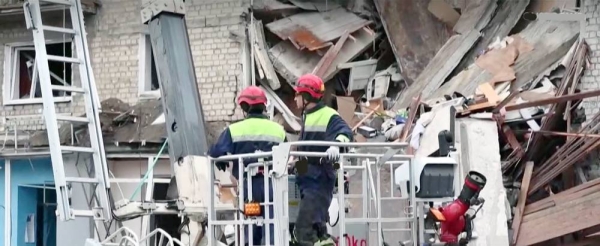Ukraine braces for new Russian assault as West fears deepening energy crisis
KYIV — Ukraine expects another onslaught by Russian ground forces, following widespread shelling that killed more than 30 people, as kyiv’s western allies brace for a worsening global energy crisis if Russia cuts its oil and gas supply.
Although the Kremlin announced a pause in its assault after claiming victory in the eastern Luhansk region after the fall of Lysychansk, Russian shelling continued throughout Ukraine.
Ukraine’s general staff says the bombings across the country amount to preparations for an escalation of hostilities as Russia seeks to seize the rest of the Donetsk region and control the entire industrial heartland of eastern Donbass.
Ukrainian President Volodymyr Zelenskyy said Russia had carried out 34 airstrikes since Saturday, one of which hit a five-story building, killing 31 people and trapping dozens.
Many Ukrainian towns and villages have been left in ruins and the human cost of the Russian invasion, the biggest European conflict since World War II and now in its fifth month, is mounting.
Just last week, the governor of Donetsk province urged its remaining 350,000 residents to move to safer places in western Ukraine.
Urging the evacuation, Donetsk Governor Pavlo Kyrylenko said it would allow the Ukrainian military to better defend the towns, adding that around 80% of the region had left by Monday.
“Once there are fewer people, we can focus more on our enemy,” Kyrylenko said, adding that the shelling had intensified and was “very chaotic”.
Attacks on key cities like Kramatorsk and Sloviansk have increased dramatically, killing and injuring dozens of civilians every week.
Observers say the two could end up like Sievierodonetsk and Lysychansk, towns now under Russian control after bombings so fierce they are virtually uninhabitable.
Ukraine’s allies have supplied it with weapons and imposed severe sanctions on Moscow. The Kremlin, in turn, used its vast oil and gas reserves to fund its war chest.
However, rifts are beginning to appear among Kyiv’s allies as nations grapple with soaring energy and food prices and rising inflation.
Europe’s dependence on Russian energy worried policymakers and businesses as the largest pipeline carrying Russian gas to Germany began 10 days of annual maintenance.
Governments, markets and businesses fear the shutdown will be extended due to the war.
Ukraine’s energy and foreign ministries said Canada’s decision to return a repaired turbine needed for the Nord Stream 1 gas pipeline that supplies Russian oil to Germany amounted to adjusting sanctions on Moscow.
Zelenskyy warned that the Kremlin would view exceptions to sanctions as a sign of weakness.
He said Moscow would now try “to completely shut off the gas supply to Europe at the most urgent time. This is what we have to prepare for now. This is what is being provoked now.”
The world price of oil could jump 40% to around $140 (€139.72) a barrel if a proposed Russian oil price cap is not passed, a senior US Treasury official said on Tuesday.
The aim is to set the price at a level that covers Russia’s marginal cost of production so that Moscow has an incentive to continue exporting oil, but not high enough to allow it to finance its war in Ukraine, said the manager.
US Treasury Secretary Janet Yellen will discuss the implementation of the US price cap proposal and global economic developments with Japanese Finance Minister Shunichi Suzuki when they meet on Tuesday, the official said.
As the European Union prepares to impose a gradual embargo on Russian oil and ban marine insurance on any tanker carrying it – a move that should be matched by the UK – Yellen sees the cap as a way to keep oil in circulation and avoid a new price spike that could lead to a recession.
Meanwhile, Russian Finance Minister Anton Siluanov, in a newspaper interview published on Monday, strongly backed a proposal by gas producer Gazprom to expand its rubles-for-gas program for the pipeline to include gas liquefied natural gas (LNG).
However, Kremlin spokesman Dmitry Peskov told reporters that no decision has been made or orders prepared on the matter.
In March, Putin said “hostile countries” should pay for Russian gas in rubles, after Russia was cut off from the global financial system.
A number of Gazprom’s biggest customers in Europe have been cut off after refusing to cooperate with the ruble-for-gas payment system, while most European and Western countries have openly refused to pay in converted rubles.
In an effort to bring down world food prices, the international goal is to reopen Ukraine’s Black Sea ports, which are closed by a Russian blockade, halting exports of one of the world’s main sources of grain and threatening to exacerbate world hunger.
Together, Russia and Ukraine export nearly a third of the world’s wheat and barley, more than 70% of its sunflower oil, and are major suppliers of corn.
Turkish President Recep Tayyip Erdoğan, who has offered to mediate the grain issue, discussed it with Putin over the phone. The Kremlin said the talks took place in the run-up to a Russian-Turkish summit scheduled for the near future.
A summit with Erdoğan would be Putin’s first face-to-face with a leader of a NATO country since the invasion and if it were to take place in Turkey, it would also be his first trip outside the territory of the former Soviet Union. —Euronews


Comments are closed.